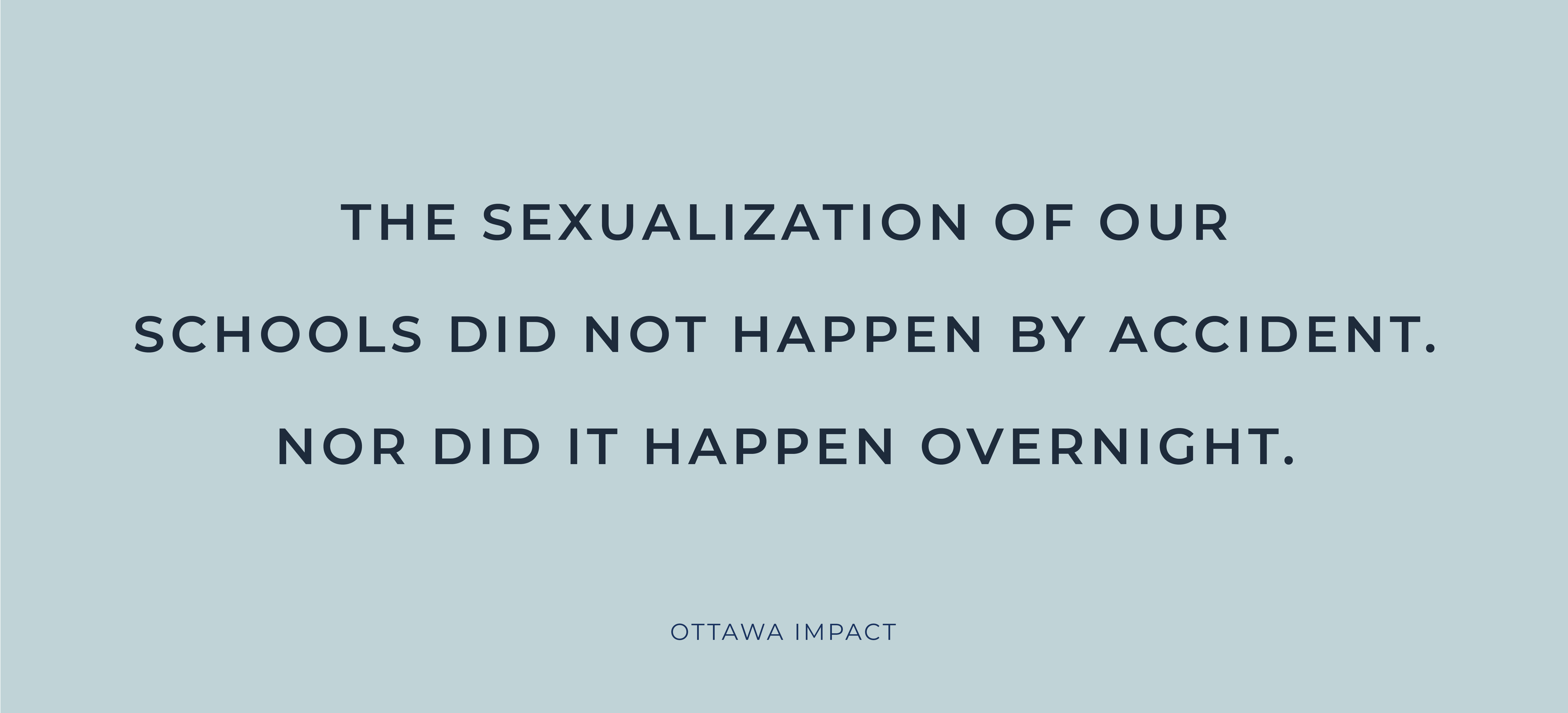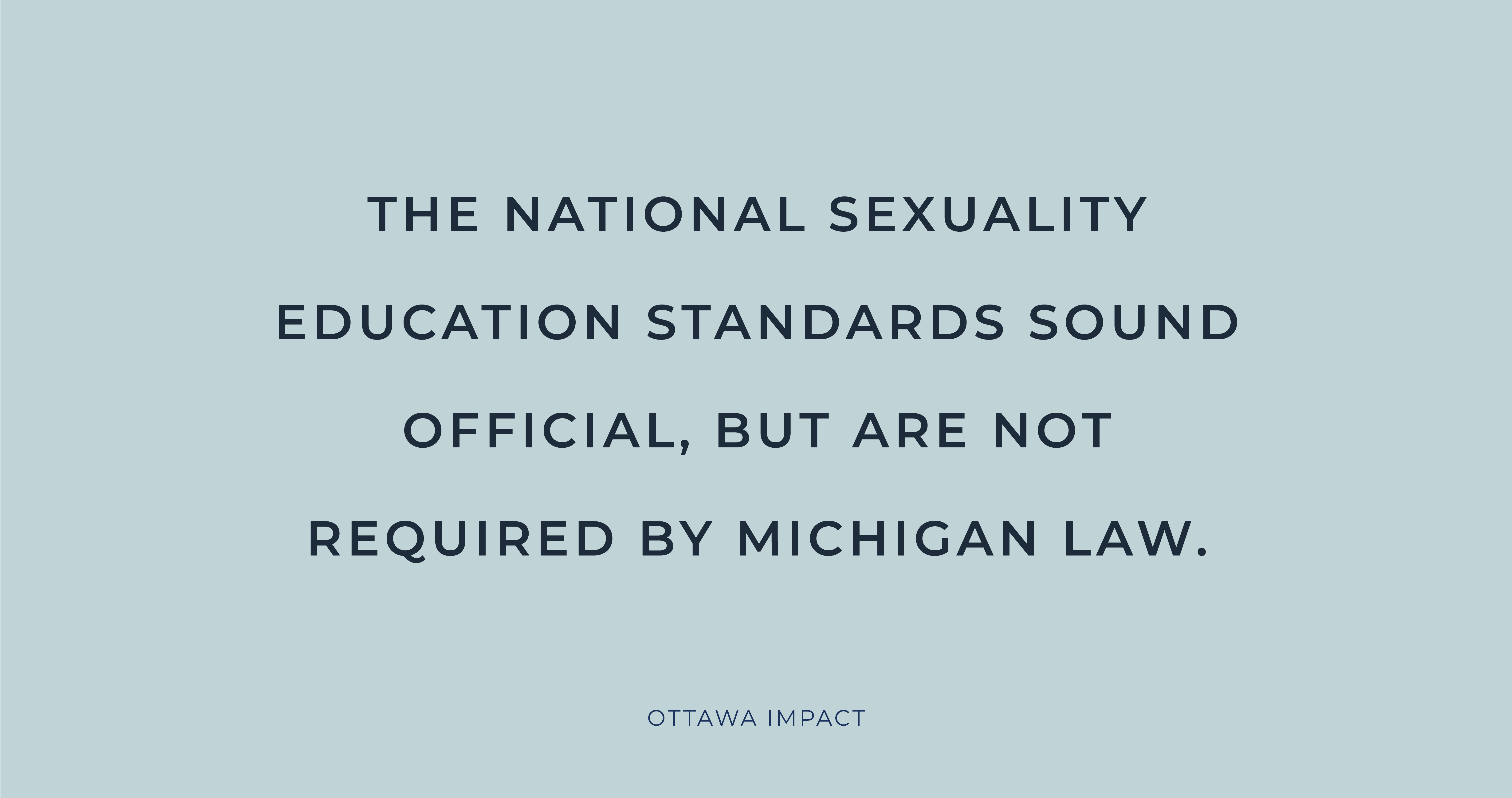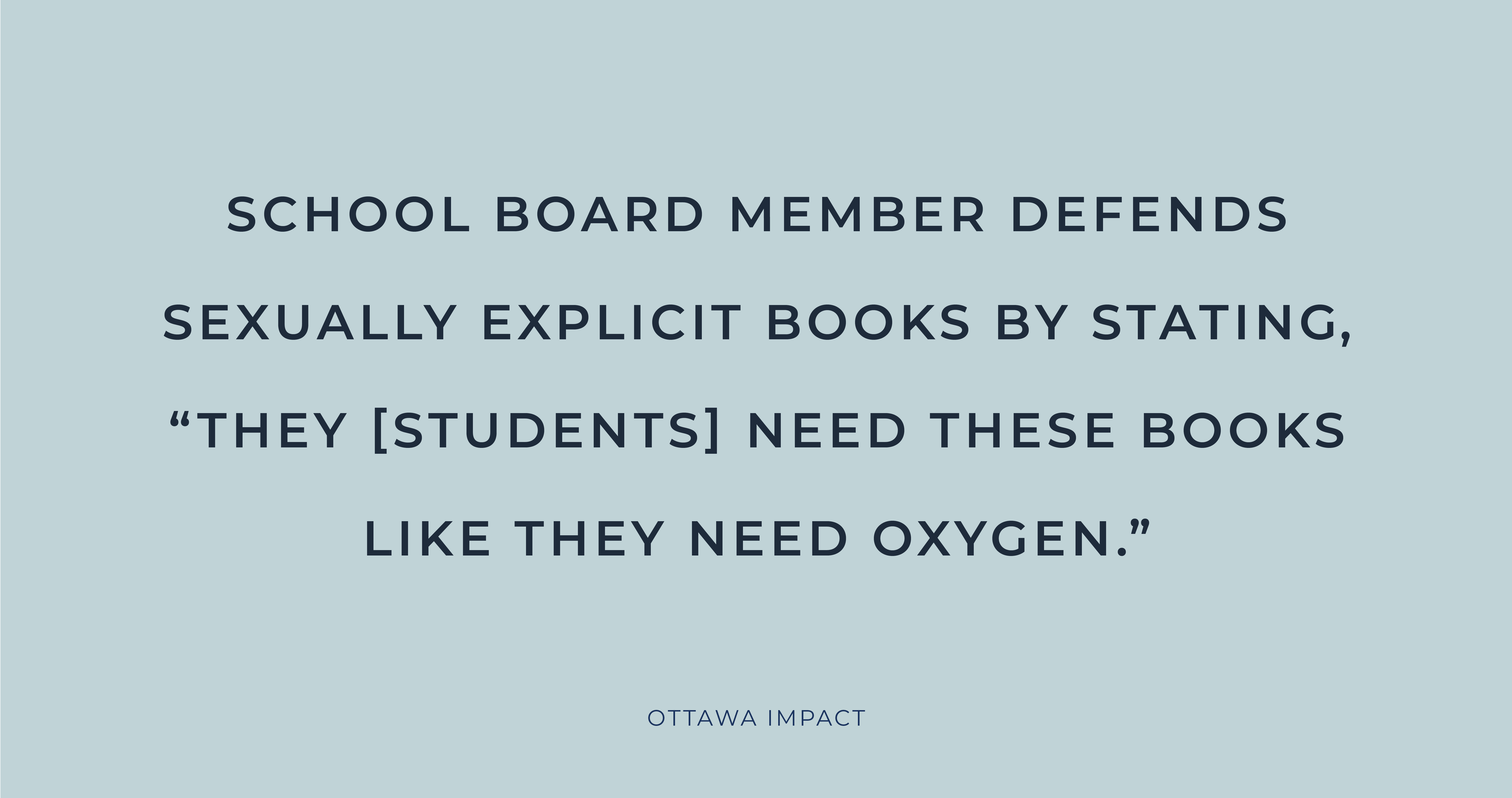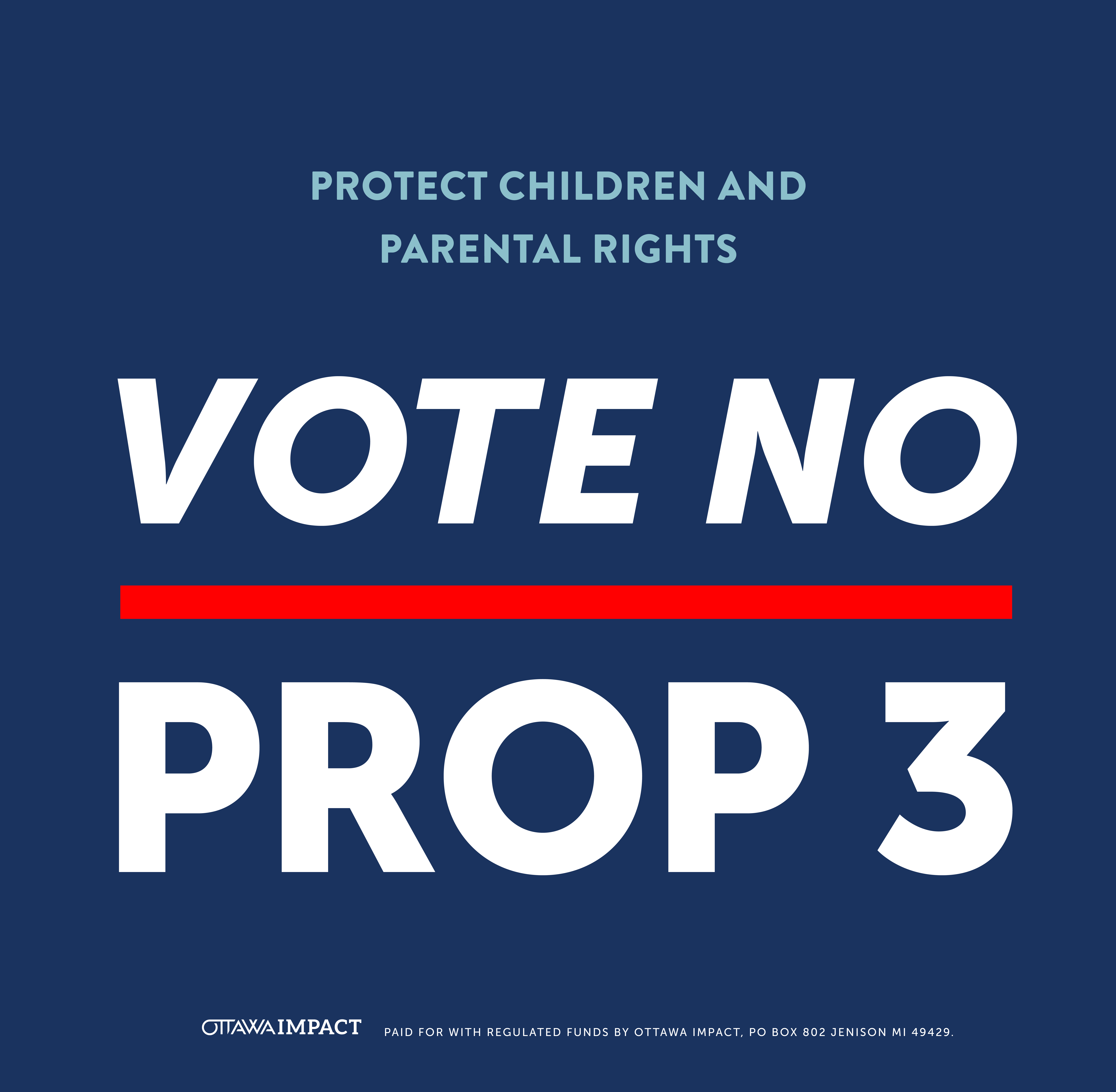Syndicated
The Sexualization of Michigan Children in Public Schools—It Was Not by Accident
Published November 2022
Written by Ottawa Impact
Photography by Simply American
Michigan’s focus on education excellence in core subjects, preparing students for higher learning and productive vocational paths, has been lost. Instead, far too many schools now prioritize progressive indoctrination.
Across our state, sexually explicit books, from cartoon porn to graphic rape, have been placed in school and classroom libraries.
How exactly did our schools become indoctrination centers for sexual pleasure, sexual violence, and child sexuality?
Published below is the original report that Ottawa Impact released.
It Was Not By Accident
The sexualization of Michigan’s children and the push to eliminate parents from education and medical decisions—which will be virtually unstoppable should Proposition 3 pass—has occurred under the strategic influence of activists within Michigan government and special interest groups.
Beyond the teachers’ unions and the Democratic Party, this network includes:
• Planned Parenthood
• National sexuality activist groups
• The Michigan Department of Education (MDE)
• Michigan State Board of Education
• Michigan Organization of Adolescent Sexual Health (MOASH, funded by George Soros)
• Michigan School Health Coordinator’s Association (MISHCA)
• Michigan’s Intermediate School Districts (ISDs)
• Local health departments and local school districts

MDE Creates Sexual Health Education Guide—Sidestepping Parents
In the summer of 2019, a Sexual Health Education Guide created by MDE sexuality educator and MOASH founder, Laurie Bechhofer, was released to Michigan’s ISD Health Coordinators at the Michigan School Health Coordinator’s Association (MISHCA) conference.
The toolkit promoted progressive Comprehensive Sexuality Education, as well as methods of disseminating aligned sexuality content to students while sidestepping parents and requirements of Michigan’s sex ed law.
In the 2019–20 school year, using the methods outlined in the guide, Michigan’s classrooms and libraries began to be flooded with graphic sexual content outside of parental knowledge and consent.
In November of 2019, the Report to Inform Legislators was created, which outlined the plan already in play, the organizations and bureaucracies involved, and the specific role of each in their coordinated efforts.
The report also warned against a movement towards medical care within Michigan schools without parental notification and consent, as has occurred in California. When California moved to require radical sex ed, the state also created pathways for school-facilitated abortion and alternative gender identities, without parental notification or consent.
The November 2019 Report to Inform Legislators, is critical to read as it outlines the systems which parents continue to defend against today.
Training Videos Exposed
In September of 2022, sexuality activism within Michigan’s education system garnered state and national attention when journalist Christopher Rufo exposed training videos which had surfaced from the Michigan Department of Education, in collaboration with MOASH, in which trainer Kim Phillips-Knope suggested educators not inform parents of their child’s gender orientation, even if they were struggling with suicidal ideation.
This was not the first collaboration between MDE and Kim Phillips-Knope. Phillips-Knope has trained educators for MDE on sexuality topics since at least 2015 through the statewide initiative, A Silent Crisis: Creating Safe and Supportive Schools for LGBTQ Youth.
MDE and ISD Health Coordinators have trained over 2100 teachers and administrators in over 300 districts through this training since 2000. Phillips-Knope co-edited five versions of the training resource guide, which included legal and policy advice written by LGBTQ activist groups.
While sexuality activism within school classrooms and libraries was more limited around the state prior to 2019, it began to escalate during the 2019–20 school year.
Comprehensive Sexuality Education (CSE) is a specific form of radical, too-much, too-early sex ed which has been hugely protested by parents in California, where it was imposed K-12 statewide in 2019.
CSE was built on the premise that children are sexual from birth, and was first based on a curriculum framework known as the National Sexuality Education Standards.
No Opt-Out Allowed: The California Sex Ed Indoctrination Documentary
An important documentary, NO OPT-OUT ALLOWED: The California Sex Ed Indoctrination, was created by the conservative organization, Our Watch, under the leadership of President and Pastor Tim Thompson, with assistance from the legal firm, Advocates for Faith and Freedom.
The documentary exposes the potential risks of allowing Planned Parenthood/ACLU aligned legislation and CSE curriculum to secure a foothold in a state, as it has in California.
Advocates for Faith and Freedom uncovered school districts in California were being advised by an ACLU attorney to FACILITATE ABORTIONS DURING SCHOOL HOURS without parental consent or knowledge, and to lie to parents and amend attendance records as needed to maintain student confidentiality.
The documentary reveals the graphic nature of CSE content, which parents need to be aware of as it spreads across the nation through local school boards, state legislation, and ballot proposals.
California parent John Andrews explained, “They talk about mutual masturbation. They discuss gender roles, the gender spectrum, and in the support materials… they take it even further. They discuss everything, topics like roleplaying for different genders, blood play, dental dams… fisting is mentioned. I mean, they mention it all.”
“If I were to show that material to a child, I would be brought up on charges, but somehow our public schools are allowed to teach this to junior high and high school kids.”

While the National Sexuality Education Standards sound official, they were created by Planned Parenthood and sexuality special interest groups, and are not required by Michigan law.
The National Sexuality Education Standards shift sex ed away from a focus on healthy decision-making and future life outcomes to a focus on teaching children the how to’s of sexual pleasure.
Further, the standards seek to move sexuality content outside the bounds of sex ed and into health curriculum. Recent years have brought sexuality content into language arts, SEL Initiatives (Social Emotional Learning), and even math problems, making it difficult to fully opt students out. A look at the revised standards reveals why.
National Sex Education Standards (Second Edition): A Shift To Include DEI/CRT/Race Equity
The National Sexuality Education Standards were updated in 2020, and renamed the National Sex Education Standards: Core Content and Skills, K–12 (Second Edition), or NSES.
Contributors and reviewers from Michigan include:
• Brittany Batell, Michigan Organization on Adolescent Sexual Health (MOASH)
• Laurie Bechhofer, HIV/STD Education Consultant, Michigan Department of Education (MDE)
• Wendy Sellers, sexuality educator and author of The Wonder Years, a puberty sex ed curriculum.
“The updated National Sex Education Standards (NSES) have been written with a trauma-informed lens; have been infused with principles of reproductive justice, racial justice, social justice, and equity; address social determinants of health and how these can lead to inequitable health outcomes; and take an intersectional approach.
This edition uses less cis- and heteronormative language that reflects a broader range of relationships and identities. It also prioritizes both content and skill-based learning to acknowledge that it is essential to couple functional knowledge with skills to help support healthy decision-making.
Increased attention also has been paid to strategically scaffold concepts and skills in order to introduce topics at age-appropriate grade levels, reflecting recent research that supports introducing some topics earlier while preparing students for more complex content and skills as they age.”
NSES integrates Comprehensive Sex Education (CSE) with the core tenets of DEI/CRT/Race Equity movements, including “power and privilege, conscious and unconscious bias, intersectionality, and covert and overt discrimination, and the principles of reproductive justice, racial justice, social justice, and equity.”
Research cited by NSES to support teaching sexuality topics at younger ages includes one teacher’s experience in teaching gender diversity and transgender experiences to elementary students in Discussing Princess Boys and Pregnant Men: Teaching About Gender Diversity and Transgender Experiences Within an Elementary School Curriculum.
Race Forward And GARE
The NSES includes a 14-page Glossary of continually evolving Sex Education Terms, and notably includes Race Forward as one of numerous organizations “whose materials and writings were referred to” in the creation of the glossary.
Race Forward has historically focused on institutionalizing the DEI/CRT/Race Equity movement into local units of government through the Government Alliance on Race & Equity (GARE). As outlined in the Pro-Life Protection Assessment: Public Health + DE&I Departments Ottawa County, Michigan, Race Forward advances not only the core tenants of CRT, but also Planned Parenthood aligned reproductive justice.

Upon the inauguration of Joe Biden, and built on their work through GARE, Race Forward began working with the Biden Whitehouse to institutionalize their Race Equity platform in federal bureaucracies, as covered by a recent article in The Epoch Times. Race Forward is funded by large foundations including George Soros’ Open Societies Foundation and the Bill and Melinda Gates Foundation.
In 2022, Race Forward created an initiative to counter parents* across American who are increasingly voicing their concern with CRT/DEI and sexuality content permeating their children’s schools.
*Original link broken.
Concerned parents are described as far-right and white nationalists, as Race Forward and multiple progressive organizations work together to counter them.
One of Michigan’s most conservative counties, Ottawa County, has felt the impact of Race Forward and the progressive GARE initiative.
As outlined in the article, The Racial Equity Movement: Assault on American Freedom, Ottawa County has been a member of GARE since approximately 2015, along with the radically progressive cities of Portland, Seattle, and Minneapolis.
Additional Michigan members of GARE include several counties, the Michigan Department of Health and Human Services (MDHHS), and the Michigan Department of Civil Rights (MDCR).
Michigan Department Of Civil Rights (MDCR)
On March 23, 2021, The Michigan Department of Civil Rights (MDCR) completed an Education Equity in Michigan report on the state’s K-12 education system, which included the GARE Racial Equity Toolkit and sample education equity plans from school districts in: Okemos, MI; Portland, OR; Roseville, MI; and Seattle, WA.
GARE’s model districts of Portland and Seattle have seen devastating riots and unrest in their cities in recent years—which the youth of Portland have been active participants in.
“MDCR is an administrative agency with investigative and enforcement authority. The Enforcement Process includes all of the tasks performed when a customer interacts with MDCR about a civil rights-related need or concern, including investigation and resolution of complaints of discrimination, outreach and education, and community engagement.”
In 2018, the MDCR “issued an interpretive statement declaring that the word ‘sex’ in Michigan’s Elliott-Larsen Civil Rights Act encompasses gender identity and sexual orientation. The Commissioner’s courageous decision allowed the Michigan Department of Civil Rights to accept complaints of discrimination on the basis of sex from Michigan’s LGBTQ community.”
On July 28, 2022, in response to the US Supreme Court ruling which overturned Roe vs. Wade, the MDCR “passed a resolution supporting reproductive rights and authorizing the Michigan Department of Civil Rights—the Commission’s operational arm—to address discrimination against individuals in the exercise of their reproductive rights. The resolution also called on the Department to support the Governor and other elected officials in protecting and advancing the reproductive rights of all citizens of the state of Michigan.”
MDHHS And School-Based Health Centers
School-based health clinics, in collaboration with Race Forward member MDHHS and MDE, are increasing across the state.
While there are benefits to access to healthcare, there are significant risks regarding the provision of medical and mental health care without full parental knowledge and consent, especially when parents are not present at the time of care.
These risks are particularly high in regards to immunization, sexual health/reproductive care, and gender identity.
On an information page for the Child & Adolescent Health Center Program, MDHHS includes a link to an issue brief on Michigan Laws Related to Right of a Minor to Obtain Health Care without Consent or Knowledge of Parents.
Also of note, the School-Community Health Alliance of Michigan, provides a Diversity, Equity, & Inclusion Toolkit on their website, with numerous progressive resources, including Race Forward, Robin DiAngelo, and Southern Poverty Law Center aligned Teaching Tolerance, which could be indicative of potential conflicts with the beliefs of some parents on medical decisions for their children.

Michigan’s education system and government bureaucracy has been infiltrated by activism, non-profits, and special interest groups aligned with the progressive wing of the Democratic Party, placing the promotion of a divisive racial and sexuality equity agenda ahead of the educational needs of students. Not only are systems in place to promote this agenda, but also to enforce it.
For more on Comprehensive Sexuality Education and DEI/CRT/Race Equity Ottawa Impact’s Statement on Parental Rights & Comprehensive Sexuality Education, and Statement on Diversity, Equity & Inclusion, CRT, Racial Equity.
Impact In Ottawa County
By January of 2020, Grand Haven parents had taken note of the influx of sexually explicit books in their school district and began to push back, requesting parental notification and consent prior to the release of such content to students.
The efforts of Grand Haven parents and community members were largely stalled by the closing of schools due to Covid-19. However, the closure of schools statewide and the use of virtual learning methods ultimately led to more parents becoming aware of what their children were being taught at school.
Sexually explicit books are now problematic in multiple school districts in Ottawa County. While some of these books were put in place without the knowledge of district school boards, the lack of protection from school board members when such books are brought to their attention is concerning.
On January 19, 2022, the Michigan Organization of Adolescent Sexual Health (MOASH), and the Michigan School Health Coordinator’s Association (MISHCA), released a K–5 Consent Toolkit for Michigan schools.
This advanced the controversial Advocates for Youth’s “3–R’s” Comprehensive Sexuality Education resources for little ones, as well as aligned online resources through Amaze Jr, and Planned Parenthood of Michigan. It is notable that while Comprehensive Sexuality
Education is advanced in the name of “consent”, novels with explicit scenes including rape are promoted as desirable reading content for middle and high school students.
At the Spring Lake Public Schools’ board meeting on October 17, 2022, school board member Katie Pigott defended sexually explicit books, stating, “They [students] need these books like they need oxygen.”
Spring Lake put guidelines around the books in question at the meeting, including the sexually explicit graphic novel Gender Queer, however, other concerning books remain in open use for students in the district. While this novel noted contains LGBTQ content, parents statewide are also concerned with explicit book content exposing children to heterosexual sex acts and violence.
Sexuality activists have also shown their hand in Michigan in recent years on the legislative front. On October 29, 2019, Gov. Gretchen Whitmer and Democratic lawmakers introduced legislation called The Reproductive Health Care Act, which among other things, sought to repeal Michigan law requiring parental consent for abortion for https://rtl.org/whitmer-reproductiuve-health-act-explained/minors.
On February 19, 2020, House Bill 5499 was introduced by 21 Democratic legislators to amend Michigan’s sex education law to mandate only Comprehensive Sex Education be used by Michigan schools to teach sex education, including sexual orientation, gender identity, and abortion as a pregnancy outcome, while forbidding the curriculum from promoting or teaching religious doctrine.
What Governor Whitmer and Democratic legislators were not able to pass through the Michigan legislature, the radical left now seeks to bring through Proposal 3.
If Michigan parents wish to protect their children and return their schools to education excellence, parents must vote no on Proposal 3 on November 8, 2022.
Elect new state and local school board members, and elect a new governor and attorney general to defend Michigan’s education system from sexuality activists and special interest groups.

Promotional graphic from the original report.
Original Article
To read the original article, please visit Ottawa Impact.
Contact Publisher
For more information, please contact Ottawa Impact.
Report to Inform Legislators—Organizations, Activists & Plans Set in Motion
Published November 2019
Written by Sylvia Rhodea, Ottawa Impact
Photography by Simply American
“It is the natural, fundamental right of parents and legal guardians to determine and direct the care, teaching, and education of their children. The public schools of this state serve the needs of the pupils by cooperating with the pupil’s parents and legal guardians to develop the pupil’s intellectual capabilities and vocational skills in a safe and positive manner.”
MICHIGAN REVISED SCHOOL CODE
380.10 Rights of parents and legal guardians; duties of public schools
Sexualized Content In Public Schools
Michigan’s children are increasingly exposed to sexualized content in public schools.
Books read to little ones (such as the story of a transgender child in I am Jazz), books in libraries and classrooms, anti-bullying campaigns, sexual behavior surveys and focus groups, graphic Sex Ed curriculum and resource websites, and Michigan’s new Social Studies Standards bring sexualized content to children.
The National Sexuality Education Standards publication, a collaboration of Planned Parenthood and LGBTQ activist groups, is a driving force behind the increase in sexual content, promoting the integration of graphic Comprehensive Sex Education (CSE) into K–12 Health curriculum.
Michigan students are also increasingly being encouraged to access sexual health services through Health Department clinics, school based clinics, and even Planned Parenthood itself, removing parental notification and consent for medical care.
Resource websites provided to students in connection with sexuality content easily connect them with Health Departments and Planned Parenthood for care. Directing children to medical care outside of parental knowledge and consent is not only concerning in regards to sexual health and abortion, but also problematic when combined with the exposure of children to gender identity materials and curriculum.
As seen in Ohio, there is potential for state agencies and courts to side step parents altogether to facilitate gender transition. Directing the care of a child is a natural right of parents, and is outside of the scope of the legal role of public schools in Michigan.
Important Documentary
An important documentary, NO OPT-OUT ALLOWED: The California Sex Ed Indoctrination, was recently created regarding Comprehensive Sex Education in California, with assistance from the law firm, Advocates for Faith and Freedom. It is valuable in understanding the potential risks of allowing Planned Parenthood aligned legislation and curriculum to get a hold in a state.
Advocates for Faith and Freedom uncovered school districts in California were being legally advised by the ACLU to facilitate abortions during school hours without parental consent or knowledge, and to lie to parents and amend attendance records as needed to maintain student confidentiality. The documentary also reveals the graphic content of Comprehensive Sex Ed.
National Sexuality Education Standards
According to Future of Sex Education (FoSE), a partnership between LGBTQ activist groups Advocates for Youth, Answer, and SEICUS: Sex Ed for Social Change, “The goal of the National Sexuality Education Standards: Core Content and Skills, K–12 is to provide clear, consistent and straightforward guidance on the essential minimum, core content for sexuality education that is developmentally and age-appropriate for students in grades K–12.”
A collaborative effort by these LGBTQ activist groups and Planned Parenthood, as well as Laurie Bechhofer of MDE, the National Sexuality Education Standards promote:
• The early and over-sexualization of children
• LGBTQ family structures and issues
• Gender identity
• Explicit sexual content
• Teaches students to become an ally/advocate on sexuality issues, even if such content contradicts the values of a student’s family.
The National Sexuality Education Standards sound official and are used to legitimize integration of Comprehensive Sex Ed materials (CSE), written to fulfill the “national standards,” into Sex Ed and K–12 Health curriculum. CSE is very much a tool used by Planned Parenthood to integrate desired content into public schools and direct students to medical care outside of parental guidance and knowledge.
Future Of Sex Education Toolkit
Future of Sex Education (FoSE) created a toolkit for parents which promotes getting rid of abstinence based Sexual Risk Avoidance (SRA) programs like Willing to Wait and replacing them with Comprehensive Sex Education curriculum.
Laurie Bechhofer of the Michigan Department of Education (MDE) forwarded the toolkit through Michigan School Health Coordinators Association (MISHCA) to Intermediate School District (ISD) Coordinators in Michigan. These coordinators then shared it with Allendale Public Schools as a resource to use with their Sex Ed Advisory Board.
During this time, Allendale’s new district administration was engaged in the process of exploring Comprehensive Sex Ed aligned curricula, despite 8 previous years of using a Sexual Risk Avoidance program with no complaints.
Frequently asked questions in the FoSE toolkit on page 7, 8, include:
“Shouldn’t parents have the final say on what their kids learn about sex? My child is not engaging in the types of behaviors these curricula address. Why do you need to teach kids about how to have anal sex? It’s all so graphic. Isn’t my child too young to be learning about sex education?”
Rights, Respect, Responsibility (3–R’S) And The Michigan Model For Health
A prominent CSE curriculum that was written to fulfill the National Sexuality Education Standards is Rights, Respect, Responsibility (the 3’R’s), written by Advocates for Youth, and recommended by Planned Parenthood. The authors have strong connections with Planned Parenthood, including Dr. Elizabeth Schroeder, who “was previously the associate vice president of education and training at Planned Parenthood of New York City and the manager of education and special projects at Planned Parenthood Federation of America. She was part of the core team that developed the National Sexuality Education Standards: Core Content and Skills K–12 (2011).”
The 3-R’s begins with teaching genitalia in kindergarten, and continues with over-sexualized content through high school. The curriculum is in use in California, and has contributed to mass parent protests and a Sex Ed sit out in 2019 of over 12,000 students.
In late 2018, Laurie Bechhofer of MDE created a Sexual Health Education Guide template for school districts. This guide includes using the 3-R’s curriculum for 11th and 12th grade Michigan students, including modules on “Gender and Sexual Orientation” and “Fantasy or Reality.”
The guide was shared with ISD Coordinators at the MISHCA Conference in June 2019, for dissemination to districts across the state. It is also available as a resource from the MDE on the Michigan Organization on Adolescent Sexual Health (MOASH) website, of which Ms. Bechhofer is a board member.
Michigan Model For Health
A Michigan OAISD coordinator wrote to Allendale Public Schools of 3–R’s, “…coordinators are working now on how to integrate these lessons with a smooth transition to the MM (Michigan Model for Health). The training focused a lot too on how to word certain things without offending students. This can easily be done in our MM training.”
Many Michigan districts use Michigan Model for Health for their Health curriculum K–12, as well as for their Sex Ed curriculum. An update to the Michigan Model for Health, to include a Pre–K module, was announced at the MISCHA conference in June 2019.
Lesson titles in the MM Pre–K module, “Comparing and contrasting family characteristics” and “Increasing self awareness and respecting the personal space of others (consent),” are consistent with National Sexuality Education Standards/3–R’s content for young students. Without viewing actual lessons, it is unknown at this time if materials of concern are included. Michigan Model for Health is a collaboration of MDE and MDHHS, and is used in over 80% of Michigan school districts, as well as numerous other states.
Besides the 3-R’s curriculum, other Comprehensive Sex Ed based curricula is recommended within our state, including ETR.
Resource Websites
Resource websites for students are also highly problematic in regards to CSE content, containing links which easily direct students to inappropriate content. California parents have protested this content and Allendale parents discovered it while evaluating proposed Sex Ed curriculum for their district.
Curriculum for use on healthy relationships by loveisrespect.org, clearly encourages students to interact with them and visit their website. While content created for the classroom appears benign, the organization’s website contains CSE content, with links to Planned Parenthood and the hugely controversial and graphic scarleteen.com. It also has live “advocates” to connect with who support sexual behaviors such as polyamory.
From the website post, Is Monogamy Not Right For You?:
“Another essential part of healthy communication is sexual boundaries, including having safe sex. Does everyone want to engage in sexual activities together? Apart? Or a combination of both? However you want the sexual boundaries to work, it’s important to communicate your wants and needs. If at any point in time you feel like your partner(s) are putting you at risk for HIV and/or STIs, then that might be a sign the relationship structure is unhealthy.”
Stayteen.org, another website proposed for use with students, connected students to their local Health Department for contraception and sexual health care outside of parental consent or notification. (stayteen.org currently redirects to the Power to Decide Teen Talk website page.
In 5 Tips for Talking To Your Doctor About Birth Control, Stayteen advised,
“‘If you’re concerned about your privacy when scheduling an appointment with your primary care physician or a gynecologist, places like Planned Parenthood provide a lot of birth control options and are the masters of confidentiality,’ Says Dr. Kate. ‘There you can pay out of pocket so that nothing is reported on your parent’s insurance, and birth control options are offered on a sliding scale.’”
Nearly 200 parents sent a letter to Allendale Public Schools outlining concerns on websites proposed for student use.
State Influences
The Michigan Department of Education, ISD Coordinators and large school districts organized under Michigan School Health Coordinators Association (MISHCA), and Health Departments are intertwined and organized contributors to the push for Comprehensive Sex Education in Michigan.
Michigan Department Of Education
Laurie Bechhofer, MPH
“…has been the HIV/STD Education Consultant with the Michigan Department of Education since 1996. She has been the project director for a federally-funded grant to promote exemplary sexual health education, access to sexual health services, and safe and supportive school environments for all students. Laurie has led a statewide initiative, A Silent Crisis: Creating Safe and Supportive Schools for Lesbian, Gay, Bisexual, Transgender, and Questioning Students. In 2008, she co-founded the Michigan Organization on Adolescent Sexual Health (MOASH). She has been invited to serve on numerous national panels including the National Sexuality Education Standards Committee, and to speak at a sex education briefing on Capitol Hill. Laurie is a past president for the Society of State Leaders of Health and Physical Education, a Fellow with the American School Health Association, and co-author of a chapter in the book, Case Studies in Global School Health Promotion.”
In late 2018, Laurie Bechhofer created a Sexual Health Education Guide for school districts, recommending Puberty: The Wonder Years for grades 4–6, Healthy Sexuality for grade 7, Michigan Model for grades 8–10, and Rights, Respect, Responsibility (3-R’s) for grades 11 and 12. The 3-R’s, suggested for 11th and 12th grade Michigan students, includes modules on “Gender and Sexual Orientation,” and “Fantasy or Reality.”
The MDE Sex Health Education Guide was released for dissemination to ISD Coordinators at the 2019 MISHCA Conference by Wendy Sellers, author of Puberty: The Wonder Years, who collaborated on the project. (Wendy Sellers is a retired ISD Coordinator, co-author of the Michigan Model, and active speaker and proponent of Comprehensive Sex Education.)
Ms. Sellers writes about MDE’s process of developing the template on her blog, which included input from national leaders in sex education, without naming those individuals.
Instructional and Non-Instructional Program Delivery
The new MDE Sexual Health Education Guide on the MOASH website outlines how sex education topics might be delivered during non-instruction times, without Sex Ed Advisory Board approval and parental consent required by law for Sex Education (p. 8–9).
“Sex education topics might be addressed during non-instruction times.
While sex education that is not part of the formal instructional time doesn’t have to go through the formal school board approval process specified in state law, our district expects these situations to be brought to the attention of the Sex Education Advisory Board and parents to be notified prior to implementation. Examples of some non-instructional situation include:
• Programs occurring during the lunch period or after school
• Grant programs that include sex education topics, such as teen pregnancy prevention or dating violence programs
• Seminars or forums that address sexuality issues and/or HIV/STI education
• Athletic team meetings
• Sex education content may appear in a variety of venues throughout the school. The following are not considered part of the instructional program; therefore, they do not require the approval required by state law. Each has its own process for approval:
• School newspapers: The content of school newspapers conforms with the policy for student publications.
• School library holdings: These are governed by library policies.
• Classroom book collections: These are not subject to the sex education laws. Research papers, debates, or speeches: Topics chosen by students that pertain to sexuality issues are allowable in non-health classes in accordance with the class teacher’s parameters, without formal school board approval.
• Resource materials in public areas of the school: This might include, but is not limited to, student-created or recommended posters in the hallways or restrooms, pamphlets in the counseling or nursing office, or artwork. These are not subject to sex education laws but will be approved by the principal or designee.
• Clothing or items with messages: These are governed by the dress code.”
A Silent Crisis Training
Since 2000, MDE and Regional Health Coordinators have trained over 2100 teachers and administrators in over 300 districts on LGBTQ curriculum and implementation of LGBTQ friendly policies into schools, with a training called A Silent Crisis.
The training materials, including legal and policy advice provided to Michigan teachers and administrators, are written by LGBTQ activist groups.
Multiple documents from A Silent Crisis were provided to the Sex Ed Advisory Board of Allendale Public Schools to support the continued teaching of gender identity curriculum, which was taught without legal approval or parental consent for several years.
SEXUAL HEALTH INITIATIVE FOR TRANSFORMATION (SHIFT)
Laurie Bechhofer of MDE also oversees Sexual Health Initiative for Transformation (SHIFT), which is being implemented in 14 Michigan School Districts. Beyond Sex Ed, this initiative contains a sexual health services component, which can be provided at school without parental notification or consent.
“Students need not only the knowledge and skills but also access to sexual health services in order to avoid HIV, other STIs, or unintended pregnancy. Schools have a critical role to play in facilitating delivery of such preventive services, by either providing onsite services through school-based health centers or connecting students to adolescent-friendly, community-based agencies, including school-linked health centers. Key adolescent health services include counseling and testing for HIV, other STIs, and pregnancy, STI treatment, referral for and/or provision of contraception, and HPV vaccinations. All services must be provided in accordance with the Michigan statutes that prohibit the dispensing of a family planning drug or device in a school (§380.1507, 388.1766).”
Michigan School Health Coordinators Association (MISHCA)
The Michigan School Health Coordinators Association (MISHCA) is made up of 24 Regional Coordinators (ISD, ESD, or large district employees). The Regional Coordinators receive direction from Laurie Bechhofer of MDE on sexuality curriculum. At the June 2019 MISHCA conference, new Michigan Model for Health curriculum was announced, including a module for Pre–K, as was the Sexual Health Education Guide for Michigan schools from Ms. Bechhofer of MDE. The Regional Coordinators (ISD, ESD, or large district employees), act as advisors to local districts and SEABs on curriculum and Sex Ed Advisory Boards.
The collaboration of the ISD Coordinators was evidenced in a broad email request for information about abstinence based Sexual Risk Avoidance program Willing to Wait, being used in Allendale Public Schools. The email request elicited input from other ISD Coordinators, including the method used by a nearby district to successfully oust Willing to Wait by using a superintendent mandate that only school district teachers could teach Sex Ed. The same technique was then applied to Allendale Public Schools when Allendale’s Superintendent mandated only district teachers could provide Sex Ed. (Previously, Allendale’s SEAB and School Board had approved Willing to Wait, which included the use of Willing to Wait instructors, as the “methods and materials” for the provision of Sex Ed.) In response to an official complaint from parents on this and other violations of the Sex Ed School Code, the ISD Coordinator advising Allendale Public Schools was given significant responsibility to investigate the concerns of violation of Michigan School Code regarding Sex Education. In absence of a definition of “methods” in the Sex Ed School Code, the OAISD supported the Superintendent’s decision.
Michigan Organization on Adolescent Sexual Health (MOASH)
The Michigan Organization on Adolescent Sexual Health (MOASH) is made up of individuals, many from the education and public health fields, who advocate for Comprehensive Sex Education*. Issues of priority to MOASH are:
• Access to sexual health services (to minors without parental consent, including abortion)
• Consent and gender based discrimination
• Expectant and parenting youth
• Comprehensive Sex Education
• Sexual orientation and gender identity (LGBTQ+)
The board currently includes, among others, Laurie Bechhofer of the MDE, and Heather Alberda of the Ottawa County Health Department.
“The Michigan Organization on Adolescent Sexual Health (MOASH)* supports the implementation of medically accurate, evidence-informed, age-appropriate, and comprehensive sexual health education in schools that is inclusive and affirming of all sexual identities.”
“Often youth are disproportionally impacted by the challenges (finances, transportation, insurance, proximity to quality care facilities, provider competence and support, etc.) that most people face in seeking care, and they also face unique challenges as minors regarding confidentiality and parental consent.”
In its official position regarding abortion, MOASH* states, “Specifically, minors’ access to abortion is often obstructed by the legal mandate for parental consent or a court-provided waiver of parental consent, obtained only via judicial bypass process. We support the removal of the parental consent mandate in Michigan.1”
MOASH provides information on obtaining a judicial bypass* for an abortion when youth cannot obtain parental permission.
* Original link broken. Updated with most recent information.
Michigan Department Of Health And Human Services (MDHHS)
MDHHS partners with the Michigan Department of Education on the Michigan Model for Health.
Local Health Departments promote Planned Parenthood materials and agenda to our children in our schools, as well as promote and in some cases provide sexual health services to our students without parental consent or notification. Each of Michigan’s Health Departments are independently members of the National Association of County and City Health Officials (NACCHO, membership requires dues), and Michigan as a whole has a state branch of the organization called MALPH. NACCHO’s policy on Sex Education encourages promotion of Comprehensive Sex Education and is against abstinence only education in schools.
The Washtenaw County Health Department was instrumental in the presentation of I Am Jazz*in all of the elementary classrooms in Saline, MI. “The Washtenaw County Task Force on Transgender Youth, in partnership with the Washtenaw County Health Department, has produced a video of various members of the greater Washtenaw community reading a children’s book about a transgender student. The County and District’s goal is to support a positive school and community environment that recognizes the differences amongst all of us. We have transgender students in our elementary buildings. It is important that all students are supported on a daily basis.” —Saline Area Schools Administration & Board of Education
Heather Alberda of the Ottawa County Health Department offered her assistance to Allendale Public Schools, after being notified by Bev Schroeder, OAISD coordinator, the Allendale Sex Ed Advisory Board was being “revamped”. She discussed conducting focus groups on sexual behavior of students in the district, and had previously provided in school sexual health services within the district (which can be provided without parental notification or consent). Ms. Alberda, a certified sexuality educator, presented to Allendale’s Sex Ed Advisory Board to educate them on the YAS behavioral data of Ottawa County youth*, which is a behavioral data survey, to include sexual behaviors, collected in many school districts. Heather Alberda serves as Secretary of the board of MOASH.
Allendale Public School’s Sex Ed curriculum proposed in 2019 included use of the websites Stayteen.org and loveisrespect.org, websites posted on a local website and Facebook page for teens by the Health Department. These sites contain links to the sexually explicit Scarleteen.com and Planned Parenthood.
The Ottawa County Health Department provides an infant to teen sexuality education packet* to parents of Ottawa County, which includes Planned Parenthood materials within the packet. Several of the book and website resources included align with the Planned Parenthood Comprehensive Sex Ed agenda, including Advocates for Youth, which promotes the 3-R’s, Planned Parenthood’s Sex Etc.org website, and Stayteen.
* Original link broken
Michigan State School Board Guidance On LGBTQ Youth
The Michigan State School Board issued a guidance related to LGBTQ issues in 2016, to be implemented with the input of the community, as required by law.
Of particular concern related to these issues, 4) Privacy and Confidentiality Regarding Disclosures. A student’s transgender status, birth name, and sex assigned at birth are confidential information and considered personally identifiable information (PII) under FERPA… When students have not come out to their parent(s), a disclosure to parent(s) should be carefully considered on a case-by-case basis. School districts should consider the health, safety, and well-being of the student, as well as the responsibility to keep parents informed. Privacy considerations may vary with the age of the students.
Here are MASB comments* for local School Boards on the State School Board guidance, which as yet do not reflect the changes from the Trump Administration on Title IX and possible complaints made to the OCR.
* Original link broken
The Legal Role Of Parents And Schools
There is a growing demand from some in our culture for adherence to a set of sexuality beliefs, requiring compelled thoughts, speech, actions to demonstrate support, and now compelled parenting and sexualization of our children through school.
Under Michigan law, the care and upbringing of children is the responsibility of parents, not schools. The parental right and religious and conscious freedom of parents to provide for the care and upbringing of their own children is protected by Michigan law and the Constitution of the United States. Further, Michigan schools are charged with developing “the pupil’s intellectual capabilities and vocational skills in a safe and positive manner.”
We stand against the over sexualization of children through curriculum aligned with Planned Parenthood, and against the division Comprehensive Sex Education brings to communities.
Parents can respectfully disagree on sexuality issues, and allow each other the dignity and freedom to raise their own children according to their own beliefs, in their own homes.
Mutual respect and freedom is supportive of ALL parents, and is supported by Michigan law. The over sexualization of children and overriding the sexual ethics taught by parents, is outside of the legal role of public schools.
“The public schools of this state serve the needs of the pupils by cooperating with the pupil’s parents and legal guardians to develop the pupil’s intellectual capabilities and vocational skills in a safe and positive manner.” 380.10 Rights of parents and legal guardians; duties of public schools. MICHIGAN REVISED SCHOOL CODE
Parents standing for parental rights and student innocence desire positive health outcomes for ALL children.
We do not believe educating children at young ages about sexuality issues and all manners of sexual pleasure (oral, anal, polyamory, etc.) is best for their physical or emotional well being, or that deliberately directing children away from the guidance of their parents in obtaining medical care for sexual health is truly looking out for the best interest of students.
If Sex Ed continues to be offered in public schools, we continue to advocate for abstinence based Sexual Risk Avoidance curriculum (SRA) such as what is offered by ASCEND, which demonstrates the healthiest outcomes for students, as supported by United States HHS data and policy. In communities where there is a substantial divide over what parents desire to be taught in Sex Ed, districts could choose to offer 2 modules, as would be respectful of the beliefs of all parents. Sex Ed and sexuality content could also simply be left to parents, as “It is the natural, fundamental right of parents and legal guardians to determine and direct the care, teaching, and education of their children.”
The bureaucracies of Michigan have created a strong network advocating for Planned Parenthood aligned Comprehensive Sex Education content to be brought to our children through our public schools.
We ask that the legislature stand strong in its support of student innocence, parental rights, and absolute transparency in regards to decision making on materials to be taught and services provided in our schools.
The opinions expressed within this article are the author’s and do not necessarily reflect the positions and beliefs of Simply American or its affiliates.



